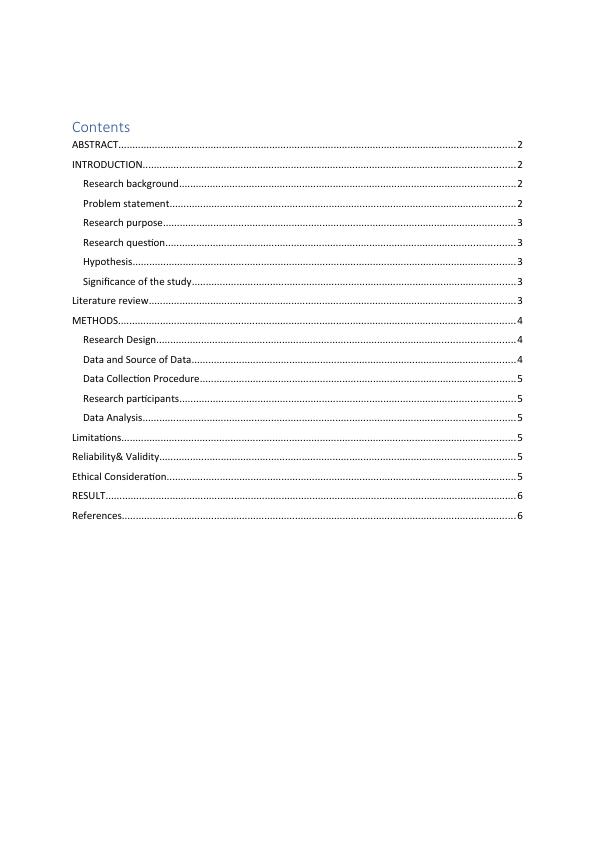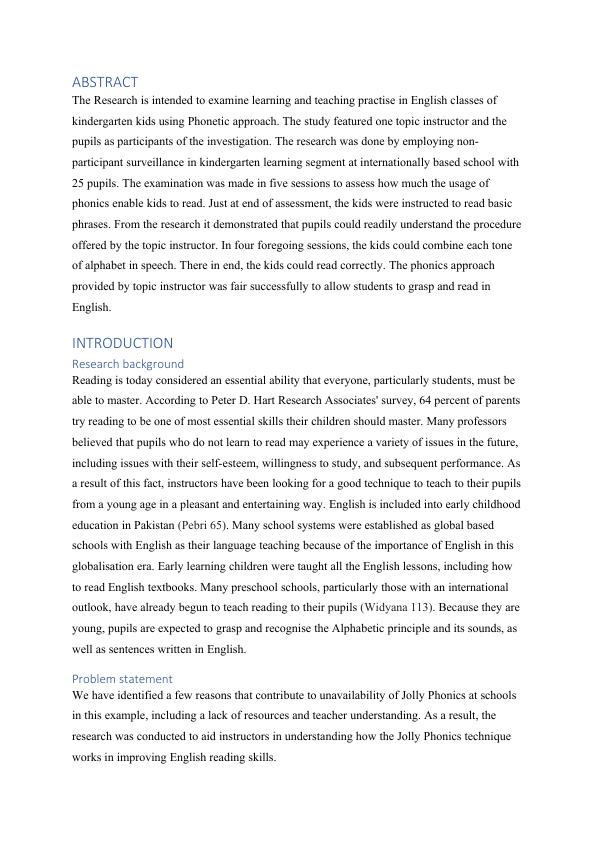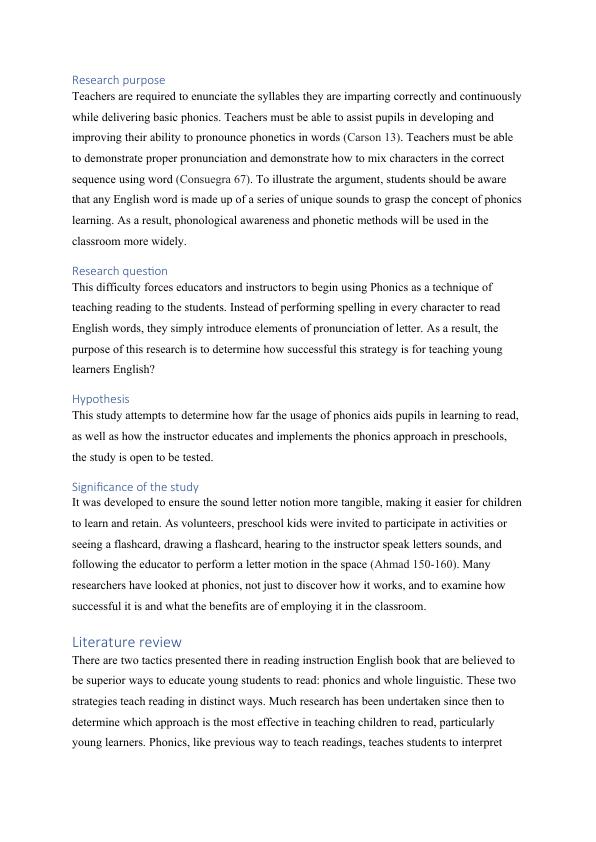Research Paper on Teaching Practices for Kindergarten Kids using Phonetic Approach
Added on 2022-03-02
7 Pages2422 Words27 Views
Contents
ABSTRACT..............................................................................................................................................2
INTRODUCTION.....................................................................................................................................2
Research background........................................................................................................................2
Problem statement............................................................................................................................2
Research purpose..............................................................................................................................3
Research question.............................................................................................................................3
Hypothesis.........................................................................................................................................3
Significance of the study....................................................................................................................3
Literature review...................................................................................................................................3
METHODS..............................................................................................................................................4
Research Design................................................................................................................................4
Data and Source of Data....................................................................................................................4
Data Collection Procedure.................................................................................................................5
Research participants........................................................................................................................5
Data Analysis.....................................................................................................................................5
Limitations.............................................................................................................................................5
Reliability& Validity...............................................................................................................................5
Ethical Consideration.............................................................................................................................5
RESULT...................................................................................................................................................6
References.............................................................................................................................................6
ABSTRACT..............................................................................................................................................2
INTRODUCTION.....................................................................................................................................2
Research background........................................................................................................................2
Problem statement............................................................................................................................2
Research purpose..............................................................................................................................3
Research question.............................................................................................................................3
Hypothesis.........................................................................................................................................3
Significance of the study....................................................................................................................3
Literature review...................................................................................................................................3
METHODS..............................................................................................................................................4
Research Design................................................................................................................................4
Data and Source of Data....................................................................................................................4
Data Collection Procedure.................................................................................................................5
Research participants........................................................................................................................5
Data Analysis.....................................................................................................................................5
Limitations.............................................................................................................................................5
Reliability& Validity...............................................................................................................................5
Ethical Consideration.............................................................................................................................5
RESULT...................................................................................................................................................6
References.............................................................................................................................................6

ABSTRACT
The Research is intended to examine learning and teaching practise in English classes of
kindergarten kids using Phonetic approach. The study featured one topic instructor and the
pupils as participants of the investigation. The research was done by employing non-
participant surveillance in kindergarten learning segment at internationally based school with
25 pupils. The examination was made in five sessions to assess how much the usage of
phonics enable kids to read. Just at end of assessment, the kids were instructed to read basic
phrases. From the research it demonstrated that pupils could readily understand the procedure
offered by the topic instructor. In four foregoing sessions, the kids could combine each tone
of alphabet in speech. There in end, the kids could read correctly. The phonics approach
provided by topic instructor was fair successfully to allow students to grasp and read in
English.
INTRODUCTION
Research background
Reading is today considered an essential ability that everyone, particularly students, must be
able to master. According to Peter D. Hart Research Associates' survey, 64 percent of parents
try reading to be one of most essential skills their children should master. Many professors
believed that pupils who do not learn to read may experience a variety of issues in the future,
including issues with their self-esteem, willingness to study, and subsequent performance. As
a result of this fact, instructors have been looking for a good technique to teach to their pupils
from a young age in a pleasant and entertaining way. English is included into early childhood
education in Pakistan (Pebri 65). Many school systems were established as global based
schools with English as their language teaching because of the importance of English in this
globalisation era. Early learning children were taught all the English lessons, including how
to read English textbooks. Many preschool schools, particularly those with an international
outlook, have already begun to teach reading to their pupils (Widyana 113). Because they are
young, pupils are expected to grasp and recognise the Alphabetic principle and its sounds, as
well as sentences written in English.
Problem statement
We have identified a few reasons that contribute to unavailability of Jolly Phonics at schools
in this example, including a lack of resources and teacher understanding. As a result, the
research was conducted to aid instructors in understanding how the Jolly Phonics technique
works in improving English reading skills.
The Research is intended to examine learning and teaching practise in English classes of
kindergarten kids using Phonetic approach. The study featured one topic instructor and the
pupils as participants of the investigation. The research was done by employing non-
participant surveillance in kindergarten learning segment at internationally based school with
25 pupils. The examination was made in five sessions to assess how much the usage of
phonics enable kids to read. Just at end of assessment, the kids were instructed to read basic
phrases. From the research it demonstrated that pupils could readily understand the procedure
offered by the topic instructor. In four foregoing sessions, the kids could combine each tone
of alphabet in speech. There in end, the kids could read correctly. The phonics approach
provided by topic instructor was fair successfully to allow students to grasp and read in
English.
INTRODUCTION
Research background
Reading is today considered an essential ability that everyone, particularly students, must be
able to master. According to Peter D. Hart Research Associates' survey, 64 percent of parents
try reading to be one of most essential skills their children should master. Many professors
believed that pupils who do not learn to read may experience a variety of issues in the future,
including issues with their self-esteem, willingness to study, and subsequent performance. As
a result of this fact, instructors have been looking for a good technique to teach to their pupils
from a young age in a pleasant and entertaining way. English is included into early childhood
education in Pakistan (Pebri 65). Many school systems were established as global based
schools with English as their language teaching because of the importance of English in this
globalisation era. Early learning children were taught all the English lessons, including how
to read English textbooks. Many preschool schools, particularly those with an international
outlook, have already begun to teach reading to their pupils (Widyana 113). Because they are
young, pupils are expected to grasp and recognise the Alphabetic principle and its sounds, as
well as sentences written in English.
Problem statement
We have identified a few reasons that contribute to unavailability of Jolly Phonics at schools
in this example, including a lack of resources and teacher understanding. As a result, the
research was conducted to aid instructors in understanding how the Jolly Phonics technique
works in improving English reading skills.

Research purpose
Teachers are required to enunciate the syllables they are imparting correctly and continuously
while delivering basic phonics. Teachers must be able to assist pupils in developing and
improving their ability to pronounce phonetics in words (Carson 13). Teachers must be able
to demonstrate proper pronunciation and demonstrate how to mix characters in the correct
sequence using word (Consuegra 67). To illustrate the argument, students should be aware
that any English word is made up of a series of unique sounds to grasp the concept of phonics
learning. As a result, phonological awareness and phonetic methods will be used in the
classroom more widely.
Research question
This difficulty forces educators and instructors to begin using Phonics as a technique of
teaching reading to the students. Instead of performing spelling in every character to read
English words, they simply introduce elements of pronunciation of letter. As a result, the
purpose of this research is to determine how successful this strategy is for teaching young
learners English?
Hypothesis
This study attempts to determine how far the usage of phonics aids pupils in learning to read,
as well as how the instructor educates and implements the phonics approach in preschools,
the study is open to be tested.
Significance of the study
It was developed to ensure the sound letter notion more tangible, making it easier for children
to learn and retain. As volunteers, preschool kids were invited to participate in activities or
seeing a flashcard, drawing a flashcard, hearing to the instructor speak letters sounds, and
following the educator to perform a letter motion in the space (Ahmad 150-160). Many
researchers have looked at phonics, not just to discover how it works, and to examine how
successful it is and what the benefits are of employing it in the classroom.
Literature review
There are two tactics presented there in reading instruction English book that are believed to
be superior ways to educate young students to read: phonics and whole linguistic. These two
strategies teach reading in distinct ways. Much research has been undertaken since then to
determine which approach is the most effective in teaching children to read, particularly
young learners. Phonics, like previous way to teach readings, teaches students to interpret
Teachers are required to enunciate the syllables they are imparting correctly and continuously
while delivering basic phonics. Teachers must be able to assist pupils in developing and
improving their ability to pronounce phonetics in words (Carson 13). Teachers must be able
to demonstrate proper pronunciation and demonstrate how to mix characters in the correct
sequence using word (Consuegra 67). To illustrate the argument, students should be aware
that any English word is made up of a series of unique sounds to grasp the concept of phonics
learning. As a result, phonological awareness and phonetic methods will be used in the
classroom more widely.
Research question
This difficulty forces educators and instructors to begin using Phonics as a technique of
teaching reading to the students. Instead of performing spelling in every character to read
English words, they simply introduce elements of pronunciation of letter. As a result, the
purpose of this research is to determine how successful this strategy is for teaching young
learners English?
Hypothesis
This study attempts to determine how far the usage of phonics aids pupils in learning to read,
as well as how the instructor educates and implements the phonics approach in preschools,
the study is open to be tested.
Significance of the study
It was developed to ensure the sound letter notion more tangible, making it easier for children
to learn and retain. As volunteers, preschool kids were invited to participate in activities or
seeing a flashcard, drawing a flashcard, hearing to the instructor speak letters sounds, and
following the educator to perform a letter motion in the space (Ahmad 150-160). Many
researchers have looked at phonics, not just to discover how it works, and to examine how
successful it is and what the benefits are of employing it in the classroom.
Literature review
There are two tactics presented there in reading instruction English book that are believed to
be superior ways to educate young students to read: phonics and whole linguistic. These two
strategies teach reading in distinct ways. Much research has been undertaken since then to
determine which approach is the most effective in teaching children to read, particularly
young learners. Phonics, like previous way to teach readings, teaches students to interpret

End of preview
Want to access all the pages? Upload your documents or become a member.
